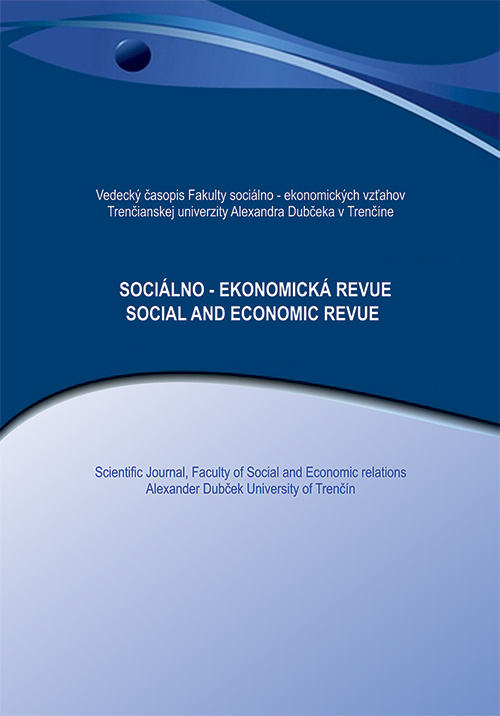COMPUTER SKILLS OF OLDER PEOPLE: CASE OF SLOVAKIA AND FINLAND
In today's world, computer skills have become a necessity. However, there are differences between countries in the level of computer literacy of people in different age groups. In the long term, Finland achieves the best results in the level of computer literacy. The goal of the research study is to specify the differences in computer skills in Slovakia and Finland. The research is focused on people aged 50+. SHARE questionnaire - Survey of Health, Aging and Retirement in Europe was used to achieve the goal. The total number of observations was 2158. Chi-square (χ2) Test for Independence, Cramér's V and adjusted residuals were used to achieve the goal. Based on the methods used, we accepted the hypothesis that there is a significant association between countries (Slovakia and Finland) and computer skills. In Slovakia, there is a large share of people aged 50+ who have never used a computer. An approach by the government to promote expansion of access to the Internet, similar to Finland, could contribute to improving computer literacy in the Slovak Republic.
Release: 2022/2 Pages: 21-28 JEL classification: C12, J24, C19
DOI: https://doi.org/10.52665/ser20220203
Keywords: Computer skills, Chi-square Test of Independence, SHARE
Section:
Contacts:
Eva Grmanová, doc. RNDr., PhD.
Faculty of Social and Economic Relations,
Dubcek University of Trencin,
Slovakia, e-mail: eva. grmanova@tnuni.sk
Literature:
Agresti, A. (2007). An Introduction to Categorial Data Analysis. Wiley-interscience a John Wiley &sons, INC., PUBLICATION. Gainesville, Florida.
Anderson, D.R., Sweeney, D.J., Williams, T.A., Freeman, j., Shoesmith, E. (2014). Statistics for business and economics. Cengage Learning EMEA.
Augner, Ch. (2022). Digital divide in elderly: Self-rated computer skills are associated with higher education, better cognitive abilities and increased mental health. European Journal of Psychiatry. 36(3), 176-181. https://doi.org/10.1016/j.ejpsy.2022.03.003
Bergmann, M. & Börsch-Supan, A. (Eds.) (2021). SHARE Wave 8 Methodology: Collecting Cross-National Survey Data in Times of COVID-19. Munich: MEA, Max Planck Institute for Social Law and Social Policy.
Biagi, F., Cavapozzi, D., Miniaci. R. (2011). Employment transitions and computer use of older workers. Applied Economics, 45 (06), pp.687-696. ff10.1080/00036846.2011.610748ff. ffhal00741504f
Börsch-Supan, A., Brandt, M., Hunkler, C., Kneip, T., Korbmacher, J., Malter, F., Schaan, B., Stuck, S., & Zuber, S. (2013). Data Resource Profile: The Survey of Health, Ageing and Retirement in Europe (SHARE). International Journal of Epidemiology. DOI: 10.1093/ije/dyt088
Börsch-Supan, A. (2022). Survey of Health, Ageing and Retirement in Europe (SHARE) Wave 8. Release version: 8.0.0. SHARE-ERIC. Data set. DOI: 10.6103/SHARE.w8.800
Börsch-Supan, A., & Gruber, S. (2022). easySHARE. Release version: 8.0.0. SHARE-ERIC. Data set DOI: 10.6103/SHARE.easy.800
Colbert, A., Yee, N., George, G. (2016). The digital workforce and the workplace of the future. The Academy of Management Journal. 59(3). DOI: 10.5465/amj.2016.4003
Dao, M. (2017). Internet Use around the world: an empirical assessment. Perspectives on global development and technology. 16(2017). p. 683-699. https://brill.com/view/journals/pgdt/16/6/article-p683_683.xml
Eurostat (2022). Dataset. [ISOC_SK_DSKL_I21$DEFAULTVIEW] https://ec.europa.eu/eurostat/databrowser/view/isoc_sk_dskl_i21/default/table?lang=en
Gruber, S., Hunkler, C., Stuck, S. (2014). Generating easySHARE: guidelines, structure, content and programming. SHARE Working Paper Series (17-2014). Munich: MEA, Max Planck Institute for Social Law and Social Policy.
Hendl, J. (2015). Přehled statistických metod. Analýza a metaanalýza dat. Praha: Portal.
Koegh, M. (2009). Management and organisational barriers in the acquisition of computer usage skills by mature age workers. Australian Journal on Ageing. 28(3), p. 122-126. DOI: 10.1111/j.1741-6612.2009.00371.x
König R and Seifert A (2022). Digitally Savvy at the Home Office: Computer Skills of Older Workers During the COVID-19 Pandemic Across Europe. Front. Sociol. 7:858052. doi: 10.3389/fsoc.2022.858052
Lee, J-W., Kwak, D. W., Song, E. (2021). Can older workers stay productive? The role of ICT skills and training.CAMA working paper, Crawford School of public policy. https://cama.crawford.anu.edu.au/sites/default/files/publication/cama_crawford_anu_edu_au/2021-01/4_2021_lee_kwak_song.pdf
Nakayama, M., Sutcliffe, N. (2004). A portfolio framework for IT skills management and best IT skills sourcing options. IRMA International Conference. https://www.researchgate.net/publication/319097004_A_Portfolio_Framework_for_IT_Skills_Management_and_Best_IT_Skills_Sourcing_Options
Peng, G. (2017). Do computer skills affect worker employment? An empirical study from CPS surveys. Computers in Human Behavior. 74 (2017), p. 26-34. https://doi.org/10.1016/j.chb.2017.04.013
Řezanková, H. (2007). Analýza dat z dotazníkových šetření. Praha: Professional Publishing.
SHARE (2022). SHARE Research Data Center. Wave 8. Retrieved from https://releases.sharedataportal.eu
Schirmer, W., Geerts, N., Vercruyssen, A., Glorieux, I. (2022). Digital skills training for older people: The importance of the “lifeworld”. Archives of Gerontology and Geriatrics. 101(2022). https://reader.elsevier.com/reader/sd/pii/S0167494322000760?token=5A493B6B63CFAC2FF6B2F5241A22054D7A44EB2680494820D20C078CD3FD9085CC86377E9C8340777A5DF6D16E886D99&originRegion=eu-west-1&originCreation=20230108145751
Stofkova, J., Poliakova, A., Stofkova, KR, Malega, P., Krejnus, M., Binasova, V., Daneshjo, N. (2022). Digital Skills as a Significant Factor of Human Resources Development. Sustainability. 14(20):13117. https://doi.org/10.3390/su142013117
Vosner, H.B., Saranto, K., Rissanen, S.t. (2012). Impact of computer training courses on reduction of loneliness of older people in Finland and Slovenia. Computer in Human Behavior. 28(4).
Weritz, P. (2022). Hey leaders. It´s time to train the workforce: critical skills in the digital workplace. Administrative Science. 12(3). https://doi.org/10.3390/admsci12030094
Wicht A, Reder S, Lechner CM (2021). Sources of individual differences in adults’ ICT skills: A large-scale empirical test of a new guiding framework. PLoS ONE 16(4): e0249574. https://doi.org/10.1371/journal.pone.0249574


